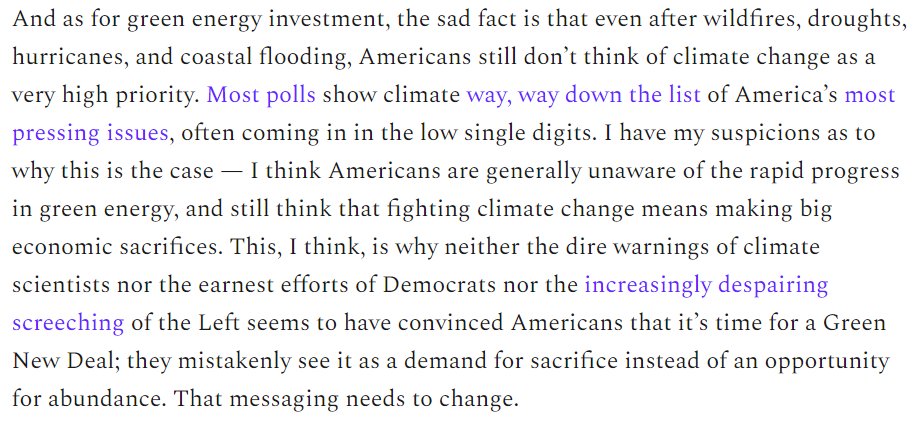
1/Let's talk about Bidenomics.
Politically, Biden's agenda has stalled. But it's still what America needs, so don't expect the basic ideas to go away.
noahpinion.substack.com/p/the-rejectio…
Politically, Biden's agenda has stalled. But it's still what America needs, so don't expect the basic ideas to go away.
noahpinion.substack.com/p/the-rejectio…
2/I think of Bidenomics as being composed of three basic elements:
1. Investment (both government and private)
2. Cash benefits
3. Care jobs
noahpinion.substack.com/p/bidenomics-e…
1. Investment (both government and private)
2. Cash benefits
3. Care jobs
noahpinion.substack.com/p/bidenomics-e…
3/Biden got off to a good start, passing a Covid relief bill that included a pioneering Child Tax Credit similar to Canada's successful program, passing an infrastructure bill that repaired roads and did some other good stuff, and passing a semiconductor industry support bill.
4/But his big follow-up, the Build Back Better bill, was stymied in the Senate by Joe Manchin, who withheld his crucial swing vote.
nbcnews.com/politics/congr…
nbcnews.com/politics/congr…
5/Naturally, this has progressives extremely frustrated.
https://twitter.com/chrislhayes/status/1494037965911244802
6/And the end of the expanded Child Tax Credit will throw a lot of American kids back into poverty.
https://twitter.com/JStein_WaPo/status/1494442131460706308
7/Now let's ask: Why did Biden's agenda stall?
The most obvious explanation is just the intransigence of old old conservative Democratic senators.
But I think there are also deeper forces at play here.
The most obvious explanation is just the intransigence of old old conservative Democratic senators.
But I think there are also deeper forces at play here.
8/First, I think Dems approached BBB in a suboptimal way, turning it into a kitchen-sink bill that appeased all their interest groups but was very difficult to sell to the public.
Folks like @crampell and @JHWeissmann pointed this out.
washingtonpost.com/opinions/2021/…
Folks like @crampell and @JHWeissmann pointed this out.
washingtonpost.com/opinions/2021/…
7/If you think I'm exaggerating how clumsy the Dems' approach was, consider the fact that the most expensive item in the bill was a tax cut for the wealthy and upper middle class.
cbpp.org/research/feder…
cbpp.org/research/feder…
8/The whole thing should have just been climate investment and child tax credit from day 1. But this kind of focus is rarely possible for Democrats, because of their structural political issues. 

9/The third reason BBB stalled, in addition to Manchin and the Dems' structural issues, was inflation.
No, BBB wouldn't have added much to inflation, if at all. It didn't raise deficits enough.
But people don't know that. And inflation is scaring them.
noahpinion.substack.com/p/four-reasons…
No, BBB wouldn't have added much to inflation, if at all. It didn't raise deficits enough.
But people don't know that. And inflation is scaring them.
noahpinion.substack.com/p/four-reasons…
10/A fourth reason is a general attitude of conservative reaction in America, exemplified by the massive increases in police budgets across the country.
nbcnews.com/news/nbcblk/ci…
nbcnews.com/news/nbcblk/ci…
11/For all these reasons, Americans just didn't support the BBB bill very strongly.
fivethirtyeight.com/features/ameri…
fivethirtyeight.com/features/ameri…

12/And unfortunately, even when we look at the best and most impactful pieces of the bill, they weren't that popular. Americans tended to oppose making the expanded Child Tax Credit -- the closest thing we're likely to get to a Universal Basic Income -- permanent. 

13/It's my belief that Americans have become afflicted with a "scarcity mindset", in which the worry that someone undeserving will get even a dollar of government benefits overrides the desire to help the country as a whole.
noahpinion.substack.com/p/americas-sca…
noahpinion.substack.com/p/americas-sca…
14/As for climate, most Americans probably still think that taking action on climate means making material sacrifices. This is no longer true, thanks to technological advancements. But the idea that "climate policy = degrowth" persists, and Americans are in no mood for degrowth. 

15/So Bidenomics has been stymied in terms of actual policy.
But it's worth remembering that FDR and Reagan also both got stymied, and it fell to later Presidents to complete their policy programs.
But it's worth remembering that FDR and Reagan also both got stymied, and it fell to later Presidents to complete their policy programs.

16/We need Bidenomics because investment (both private and public) is falling, which will make us poorer in the future. 



17/We need Bidenomics because a world of 3C of warming -- which is now "business as usual" -- would be hugely disruptive to our way of life. Even 2.4C, which is what we'll get with current promised policies, is too high.
18/And we need Bidenomics because cash benefits are, in most cases, a much better way to run a welfare state than the kludge of bewildering and inefficient means testing and work requirements we have now.
bloomberg.com/opinion/articl…
bloomberg.com/opinion/articl…
19/So while Biden's agenda has been stalled (and likely will be stalled even more when Republicans take back one or both houses of Congress in 2022), the IDEA of Bidenomics needs to survive, because it's the way forward for our country.
20/Ideologies and policy programs exist to combat the problems of the day. And Bidenomics emerged because the present era's problems demand this sort of approach.
It isn't going away.
(end)
noahpinion.substack.com/p/the-rejectio…
It isn't going away.
(end)
noahpinion.substack.com/p/the-rejectio…
Oh, and remember to sign up for my Substack's free email list, if you haven't already!
noahpinion.substack.com
noahpinion.substack.com
• • •
Missing some Tweet in this thread? You can try to
force a refresh





